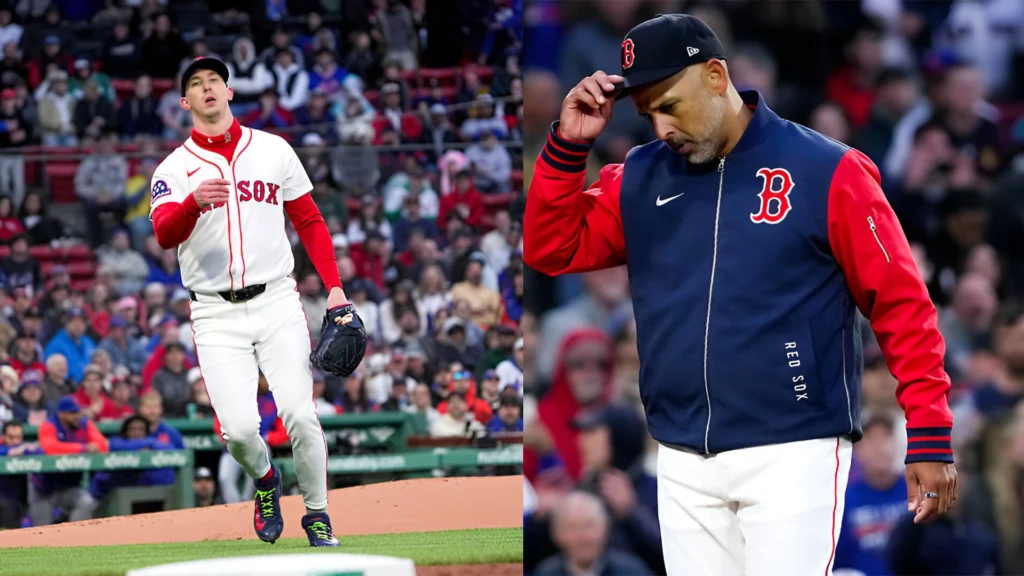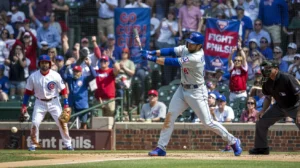
BOSTON, MA – The historic green monster of Fenway Park bore witness to a tempestuous encounter Tuesday night as Boston Red Sox ace Walker Buehler, making a highly anticipated return from the injured list, was ejected from the game against the New York Mets in a dramatic third-inning exchange with home plate umpire Mike Estabrook. The ensuing fireworks also saw manager Alex Cora tossed, transforming a routine early-season contest into a controversy-laden spectacle that ultimately highlighted the resilience of the Red Sox bullpen.
The pivotal moment arrived in the top of the third inning. Mets leadoff hitter Francisco Lindor, already on base after being hit by a pitch, successfully stole second on what many, including Buehler and the Red Sox broadcast team, believed was a clear strike to Juan Soto. Estabrook, however, ruled it a ball. The immediate vocal displeasure from the mound was palpable, setting the stage for the dramatic Walker Buehler Ejection.
According to crew chief Laz Diaz, the reason for the Walker Buehler Ejection was clear: stepping off the mound to argue balls and strikes. While pitchers are permitted to voice their opinions from their position, moving towards the umpire to dispute a call is an automatic ejection. This seemingly minor step ignited a firestorm that left Fenway Park abuzz with a mixture of disbelief and outrage.
Eyewitness accounts and broadcast replays suggested a significant escalation from both sides. As Buehler voiced his frustration, Estabrook reportedly removed his mask and engaged in a verbal confrontation, a move criticized by some as unnecessarily combative and a catalyst for further tension. The quick removal of one of the Red Sox’s most anticipated comeback stories sent shockwaves through the dugout.
Manager Alex Cora, renowned for his passionate defense of his players, wasted no time in rushing from the dugout to confront Estabrook. Cora’s immediate and heated argument mirrored Buehler’s earlier frustration, leaving little doubt as to his feelings on the call and his pitcher’s dismissal. It wasn’t long before Cora, too, was ejected, adding another layer of drama to an already unforgettable sequence. First base umpire Laz Diaz had to physically intervene, separating the fiery manager from the equally resolute umpire.
“I was surprised by the ejection,” Cora stated after the game, still visibly agitated. “I was hoping he would toss me and let Buehler stay in. He’s an important part of this team, especially tonight.” Cora’s sentiment echoed the collective frustration of the Red Sox faithful, who had eagerly awaited Buehler’s return to the mound.
For Buehler, the early exit was a bitter pill to swallow. Making his first start since a significant injury layoff, the right-hander expressed remorse for his actions. “I said some things that I thought I shouldn’t have said,” Buehler admitted post-game, acknowledging that his outburst put his team in a precarious position. His social media activity later hinted at lingering frustration, seemingly reacting to Mets’ Francisco Lindor’s apparent gesture for his ejection from second base – a subtle yet potent indicator of the competitive fire still burning within the Red Sox star.
Despite the highly contentious Walker Buehler Ejection and Cora’s subsequent removal, the Red Sox bullpen demonstrated remarkable fortitude. Stepping into the void left by their ace, the relief corps delivered a masterful performance, combining for a shutout and stifling the Mets’ offense throughout the remainder of the game. The 2-0 victory, while hard-fought and ultimately triumphant, will undoubtedly be remembered more for the dramatic ejections that unfolded in the early innings. This incident serves as a stark reminder of the fine line between competitive passion and disciplinary boundaries in the intense world of Major League Baseball. The Walker Buehler Ejection will certainly be a talking point for weeks to come, adding another chapter to the rich tapestry of Fenway Park’s storied history.

